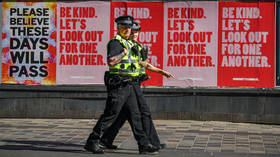UK sliding toward Victorian-era class divides – report

Covid-19 lockdowns have left many UK residents poorer, more economically hopeless and suffering from higher rates of disability and mental illness, a new study has claimed.
The report, released on Sunday by the London think tank Centre for Social Justice (CSJ), cited several alarming trends that it said were triggered by the lockdowns, including a 700% surge in calls to domestic-abuse hotlines and a 134% jump in school absenteeism. The rate of children suffering from mental illness climbed to one in six from one in nine. Mental disorders are even more prevalent among older school-age Brits, plaguing nearly 25% of 17- to 19-year-olds.
“There are likely to be 108% more boys with mental health disorders by 2030 than there would have been if the lockdown had not happened,” CSJ said. “We should worry about the problems of the next generation.”
If current trends continue, the report added, as many as 2.3 million children – or more than one in four 5- to 15-year-olds – will be diagnosed with mental disorders.
Government-imposed lockdowns during the Covid-19 pandemic kept UK children out of classrooms for months on end and wiped out thousands of businesses. Millions of workers were furloughed from their jobs. Adding insult to injury, at least one of the lockdowns failed to slow the spread of Covid-19, and critics argued that the negative effects far outweighed any benefits. University of Edinburgh epidemiologist Mark Woolhouse called the lockdowns a “lazy” strategy that “succeeded only in making a crisis even worse.”
The CSJ study was based on surveys of 3,000 low-income UK residents and 3,000 respondents from the public at large. It found that economic effects of the lockdowns left the poorest Brits no better off today than at the nadir of the 2008-2009 global financial crisis. The country also is suffering from a widening gap between rich and poor, putting the UK in danger of sliding back into the level of class divides experienced during the Victorian era, the think tank said.
“There is a growing gap between those who can get by and those stuck at the bottom,” the report warned. In fact, the study found that 40% of low-income respondents reported having a mental illness, compared with a 13% rate in the general population.
The UK now has 2.6 million people sidelined from the workforce because of long-term disabilities, an increase of nearly 500,000 since the Covid-19 pandemic, CSJ said. The number of doctor visits by people living on public benefits has more than doubled since March 2020.
Rates of substance abuse also have risen sharply. Deaths from alcohol poisoning are on the rise again, at a 15% rate, after being in decline before the pandemic, the report said. The number of deaths among people taking methadone, which is prescribed to treat drug addiction, has climbed 63%.
“This report makes for deeply uncomfortable reading,” said Andy Cook, CSJ’s chief executive. “Lockdown policy poured petrol on the fire that had already been there in the most disadvantaged people’s lives, and so far, no one has offered a plan to match the scale of the issues.”














